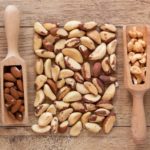
Tiana Hape-Cramond
(Associate Registered Nutritionist)
Note — The article was checked and updated December 2023.
Brain is a complex organ and we are still learning about it. It’s responsible for many conscious and unconscious actions, and to function properly it needs a wide range of nutrients, such as protein.
Proteins are an essential part of the diet, and they can be obtained from plant or animal sources. Essential amino acids are a product of proteins being broken down during digestion.
To understand the benefits of protein for the brain, it is important to understand what a protein is. So, let’s start there, and then we’ll learn more about the effects of proteins on the brain and sources of protein in the diet.
What is Protein?
Protein is an essential building block for the body and is required for tissue, bone and muscle growth and repair.
Dietary protein is introduced through our diet and during digestion is broken down into amino acids. Proteins are a source of energy and play a role in
- Creating enzymes
- Hormones
- Neurotransmitters
- Nitrogen-containing compounds such as creatine and peptide hormones[1]
Protein is important for immune function, cell processes and cellular structure
It is then not surprising that proteins are also important for brain health because they deliver nutrients to the brain for maintenance and regulation. This ensures optimal brain function.[2]
Dietary protein can be found in both animal and plant sources. They contain the essential amino acids that are not produced or synthesized by our body.
Animal protein or Plant protein - which is better and what is the difference?
Dietary proteins from animal sources are called complete proteins because they include all essential amino acids.
RELATED — What are Amino Acids and what is their role in keeping us healthy?
Complete proteins can be found in
- meat
- seafood
- animal products (milk, cheese, butter and eggs)
Likewise, plant proteins are found in plant-based food sources. Plant-based foods are highly nutritious as they provide a good source of protein, dietary fiber, vitamins and minerals.[3]
RELATED — What is a plant-based diet: Vegan or Vegetarian?
The differences between animal and plant proteins is in the type and quantity of amino acids.
Animal sources of protein include all nine essential amino acids. In saying that, plant protein such as pea protein and soybeans also contain all nine essential amino acids. However, other sources of plant protein do not.[4]

Another important thing to mention is the bioavailability of protein, which indicates how well the protein can be used in the body.
Protein with high bioavailability is easily absorbed
For instance, beans and legumes are a good source of protein, but they are incomplete proteins and have to be combined with other protein sources to supply all amino acids necessary to meet dietary requirements.
Eggs are complete proteins and have a high score on the Protein Digestibility Corrected Amino Acid Score, which is a score to measures protein quality and digestibility.[5]
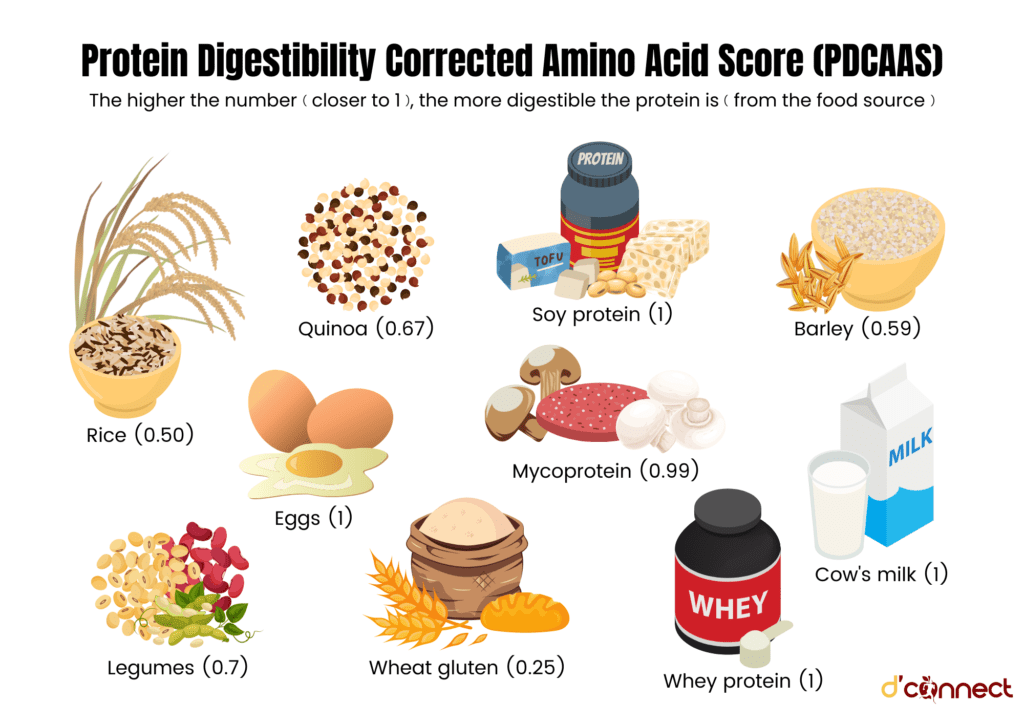
There are benefits to both sources of protein. Also, diets that rely on mainly plant proteins have been linked to lower risk of stroke, heart disease, and may extend their lifespan.[4]
Best Sources of Plant Protein
Plant proteins come in different forms, each containing important nutrients. Below are some sources of dietary proteins from plant products.
Plant Protein Source | Per 100g | Daily Value (DV) Men / Women |
Spirulina | 57.1g | 89% / 124% |
Nutritional yeast | 50g | 78% / 108% |
Hemp seeds | 27g | 42% / 58% |
Seitan | 25g | 39% / 84% |
Chia Seeds | 17.8g | 27% / 38% |
Tofu | 12 – 20g | 18% – 31% / 26% – 43% |
Oats | 12.5g | 19% / 27% |
Vogels mixed grain bread | 9.7g | 15% / 21% |
Lentils | 9g | 14% / 19% |
Beans | 8.8g | 13% / 19% |
Green peas | 5.6g | 8% / 12% |
Quinoa | 4.8g | 7% / 10% |
Wild rice | 4.2g | 6% / 9% |
Spelt and teff | 4g | 6% / 8% |
Soy milk | 2.4g | 3% / 5% |
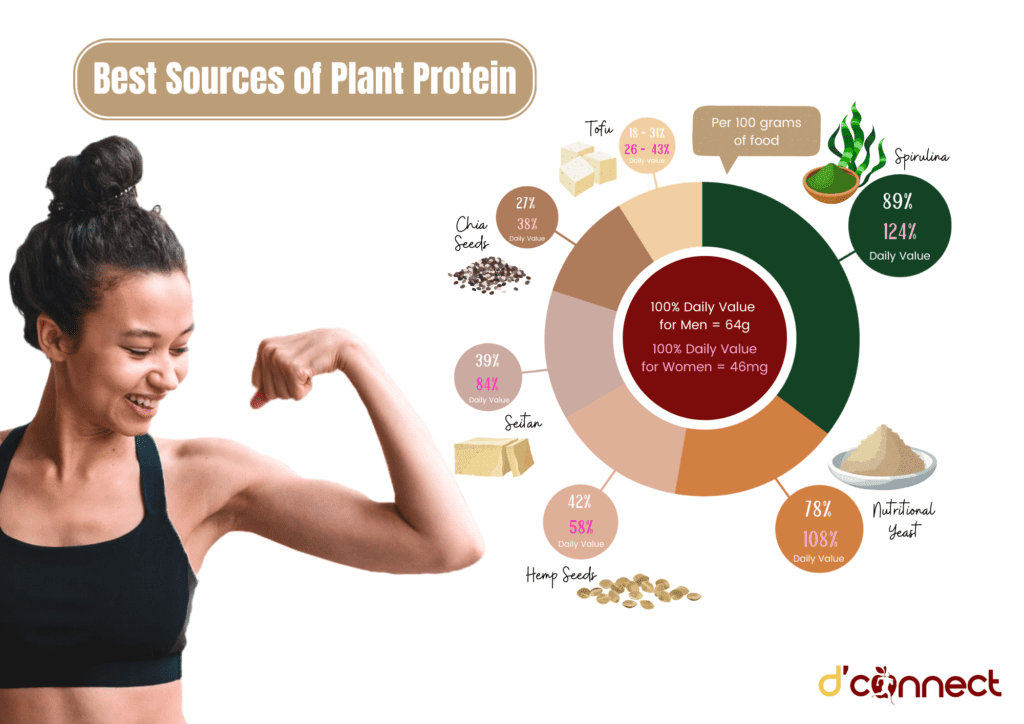
For those following a vegan diet, eating a range of plant-based proteins is important. Mixing sources of proteins means that vegans are able to receive all the essential amino acids. Nearly all vegetables, beans, nuts and grains contain protein, so it is relatively easy to meet daily protein requirements.
As an example, to reach 25% of daily protein recommendation, we just need to eat ½ cup of oats with 1 cup of soy milk.
Best Sources of Animal Protein
All animal products contain proteins but amounts vary depending on the type of animal, age and cut of meat.
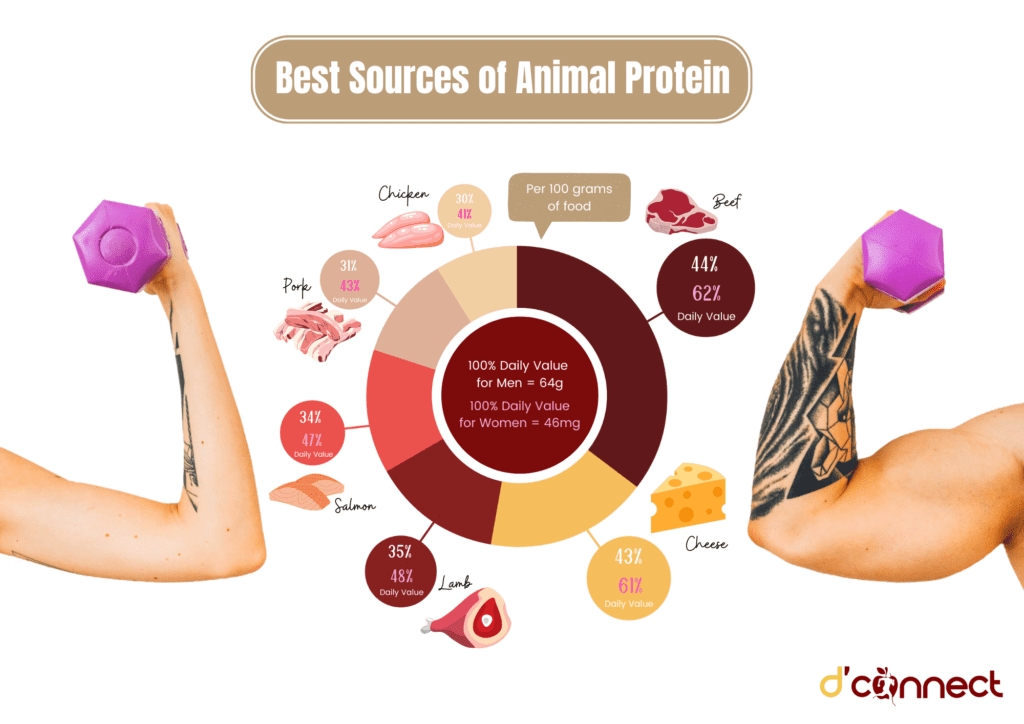
Animal Protein source | Per 100g | Daily Value (DV) Men / Women |
|---|---|---|
Beef | 28.6g | 44% / 62% |
Cheese | 28.1g | 43% / 61% |
Lamb | 22.5g | 35% / 48% |
Salmon | 22g | 34% / 47% |
Pork | 20.2 | 31% / 43% |
Chicken | 19.3g | 30% / 41% |
Eggs | 13.1g | 20% / 28% |
Sausage | 12g | 18% / 26% |
Yogurt | 5.1g | 7% / 11% |
Milk | 3.3g | 5% / 7% |
Note – Always look for sources of animal protein that have been grass-fed.
How much protein do we (really) need daily?
There is no definitive answer to how much protein a person needs to consume. The amount of protein our body needs depends on our individual activity level, weight, diet and overall health goals.
Most people will get all the protein they need from their diet alone. On average, it is estimated that a person who is generally sedentary (very limited physical activity) should consume 0.8 grams of protein per kilogram of body weight. This number increases with the amount of physical activity.
Aerobic exercise demands a higher protein intake
Individuals who regularly perform aerobic exercises “need” 1 to 1.6 grams of protein per kilogram of body weight. On the other hand, someone who does mainly strength training will require 1.4 to 1.7 grams of protein per kilogram of body weight.[6]
Age | Male | Female |
1-3 years | 14g | 14g |
4-8 years | 20g | 20g |
9-13 years | 40g | 35g |
14-18 years | 65g | 45g |
19-70 years | 64g | 46g |
>70 years | 81g | 57g |
The recommended intake for protein (average individuals) was collected from the Nutrient Reference Values Australia and New Zealand.[7]
Why is protein important for brain health?
The brain is composed of 60% fat while the remaining 40% is a combination of water, protein, carbohydrates and salts.[8]
Brain requires all the necessary nutrients to function efficiently and healthy. This includes
- Vitamins
- Minerals
- Proteins
- Carbohydrates
- Fats
RELATED — Diet and the Brain: Fats
Proteins are also important for aiding the development of necessary chemicals for signal transmission.[9]
Health benefits of protein for the brain
Protein enhances healing
It is important to remember that proteins are the building blocks of tissues, bones and muscles so it is no surprise that protein aids in the healing process.
A study conducted on mice found that eating a diet high in protein increased branched chain amino acids
- Leucine
- Isoleucine
- Valine
These branched-chain amino acids are also called essential amino acids, and they build muscle, decrease muscle fatigue and soreness.
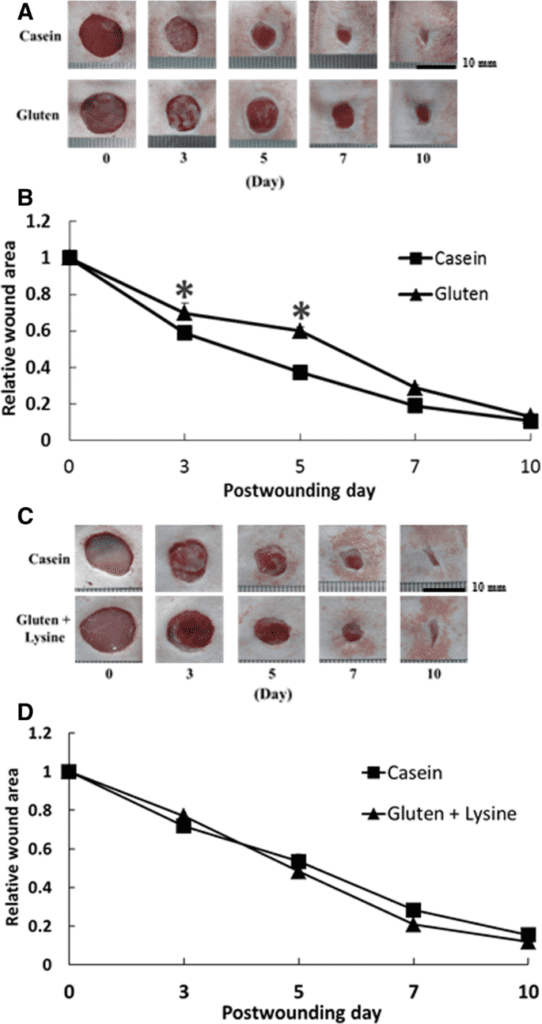
Source: Yamane, T., Negative effects of a low-quality protein diet on wound healing via modulation of the MMP2 activity in rats. Amino Acids 52 (505-510) 2020.
During a brain injury, neuronal excitation and inhibition is affected. The consumption of protein is thought to restore balance to these neurons by creating more neurotransmitters, and enhancing brain performance.[10]
Protein prevents inflammation and disease
Inflammation is the body’s response to a harmful stimulus. This can occur after the brain has sustained an injury.
Research was conducted to investigate the relationship between supplementation of whey protein and inflammation and stress markers caused by ischemic stroke.
This study found that whey protein, containing a rich source of branched-chain amino acids, can significantly decrease inflammation markers in patients with ischemic stroke.[11]
Protein boosts memory and brain function
Specific proteins can have different effects on the brain. Netrin is an important protein in the body which strengthens connections in the brain cells.
Research on adult rat brains has revealed that netrin can strengthen neural connections in the hippocampus which is responsible for memory and cognitive function.[12]
Clusterin, on the other hand, which is produced after exercise, is a protein that is responsible for enhancing brain cognition.
In one research, clusterin collected from “running mice” was injected into mice that were generally sedentary. The study found that the existence of anti-inflammatory factors is transferable (from exercising mice) and can benefit the brain of sedentary mice by boosting memory and dampening brain inflammation.[13]
Protein signals satiety and reduces the risk of obesity
Mu-opioid receptors are responsible for modulating food intake. Researchers have found that peptides, made by the digestion of proteins, can block these receptors, causing a lack of appetite.
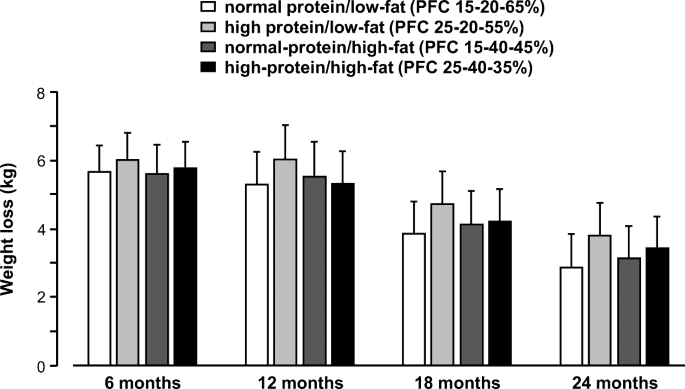
Source: Magkos, F., The role of dietary protein in obesity. Reviews in Endocrine and Metabolic Disorders 21 (329-340) 2020.
The peptides send signals to the brain that are then transmitted to the gut to stimulate the release of glucose which suppresses the need to eat. This was tested on mice, it was found that when genetically engineered mice without mu-opioid receptors were fed a high protein diet there was no change in appetite.[14]
Protein promotes the health of neurotransmitters
As most neurotransmitters are synthesized by amino acids, this suggests that protein has an important function in the health and role of neurotransmitters.
A study on mice found that protein deficiency can cause abnormal physiological changes in the brain. These changes can decrease neurotransmitter levels. Increasing the protein intake is thought to reverse this decrease but further research is needed to fully understand the mechanisms.[15]
Protein increases tyrosine
Tyrosine is an amino acid that has important roles in creating chemicals like
- Dopamine
- Adrenaline
- Noradrenaline
- Thyroid hormones
- Melanin
Increasing dopamine, adrenaline and noradrenaline may improve memory and performance in stressful situations.[16]
Brain health and low protein intake
In the previous section, we saw that optimum protein diets enhance brain performance. Let’s now explore the effects of low protein intake on the brain.
Low protein intake can be due to
- low protein diet
- health conditions that can affect the absorption and digestion of proteins
Low protein intake and aggression levels
Tryptophan is an essential amino acid that is used to produce serotonin which is important for mood.
The depletion of tryptophan, due to low protein intake, can affect the production of serotonin. This, in turn, can negatively affect mood and cause aggressive behavior.
A study conducted on women found that tryptophan depletion correlates to aggression. The women in the study were given amino acid drinks containing either balanced tryptophan or depleted tryptophan. The results found that women who consumed the tryptophan depleted drink were more easily aggravated when provoked.[17]
Protein RbAp48 and memory loss
Protein RbAp48, produced by our body, is known to interact with histones which are crucial for memory consolidation. Physical activity, dietary supplements or pharmaceuticals could be used to increase protein RbAp48.
Lack of this certain protein in young mice showed that the mice were unable to form robust memories of novel objects and locations.[18]
Low protein and ADHD connection
Amino acids tyrosine and/or tryptophan are precursors for dopamine and norepinephrine which have been implicated in the pathophysiology of ADHD.
Tyrosine can be found in foods such as
- Soybeans
- Cheese
- Milk
- Sesame seeds
A study of 14 boys with ADHD and 13 boys without ADHD looked at the fibroblast cells to understand the transport of tyrosine, tryptophan and alanine. It found that children with ADHD had decreased access to tryptophan and elevated access of alanine in the brain.
A decrease in tryptophan may cause disturbances in the neurotransmitter system.[19]
Protein deficiency and epilepsy
Research conducted on rats discovered that when rats have a protein deficiency and lack certain proteins, they are more susceptible to a drug which causes epiletic seizures.
It is thought that diets with low protein result in lack in essential amino acids which may trigger a seizure.[20]
Low protein diet and anxiety
To investigate the correlation of low protein and anxiety-like behaviors a study was done on male mice who were fed either a low protein diet (5% casin) or a control diet (20% casin). The study found that mice fed a low protein diet showed more anxiety-like behaviors when compared to those fed the control diet.[21]
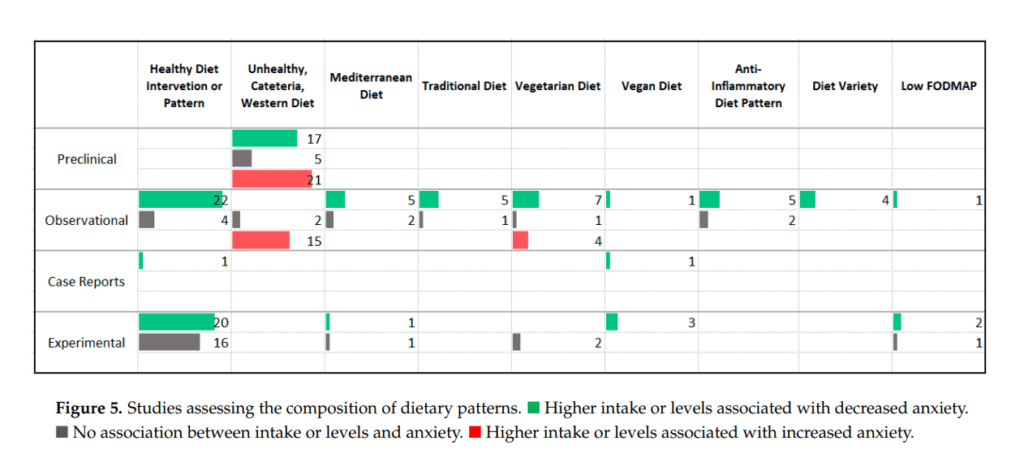
Low protein and cognitive function
Another research performed on mice found that consuming a low protein diet can lead to learning disabilities and impulsive and hyperactive behavior.
A low protein diet may cause low blood amino acid levels which results in a neurotransmitter deficiency in the brain. This decrease in neurotransmitter is thought to be the cause of the decrease in cognitive function.[15]
This is demonstrated in humans with an investigation on older adults. This study found that being on a high sugar/low protein diet had poor performance on cognitive function tests and verbal fluency tests.[22]
Protein deficiency and low hormone production
Proteins are also used in the production of hormones.
Hormones produced by the pituitary gland mostly use proteins as their building blocks.
Low protein diets have been linked to low hormone levels including growth hormones and estrogen. This is demonstrated by a study on mice. When protein was removed from their diet, there was a decrease in Follicle-Stimulating hormone (FSH) and Luteinizing hormone (LH).[23]
Brain health and excess protein intake
The concern of a high protein intake and negative effects to the brain is that the protein may be replacing carbohydrates which are also important for brain health.
However, it is highly unlikely that any individual can consume enough excess protein to cause extreme health issues.[5] Also, the body has in-built mechanisms that can signal when our dietary intake, of any nutrient, is going in the wrong direction.
High protein intake and brain fog
Brain fog is the diminished mental capacity or inability to concentrate clearly. There are many factors that can cause brain fog such as
- Lack of sleep
- Anxiety
- Obesity [24]
However, brain fog can also be caused by excess intake of protein. When the protein intake increases, the carbohydrate intake decreases causing a sugar deficit.[25]
RELATED — Diet and the Brain: Our brain on sugar
High protein diets and brain shrinkage
Brain shrinkage can occur naturally in humans due to aging. But, cell loss can occur due to brain injury, infections or medical conditions such as dementia.
Researchers have found that supplying mice with a high protein/low carbohydrate diet lightens the mass of the brain by 5% and the hippocampus is less developed.[26]
A brief note on Amino Acids
Amino acids are the building blocks of protein and play an important role in building proteins, hormones and neurotransmitters. Each protein is made up of a combination of amino acids. The arrangement of amino acids determines the different shapes and functions of the protein.
There are 22 amino acids
Most of the amino acids can be made by the body itself. Nine of the 22 must be introduced through diet – these are known as essential amino acids.
Essential amino acids include
- Histidine
- Isoleucine
- Leucine
- Lysine
- Methionine
- Phenylalanine
- Threonine
- Tryptophan
- Valine
Another group of amino acids are conditional amino acids. These amino acids are only considered essential when the body is ill or stressed.
Conditional amino acids include
- Arginine
- Cysteine
- Glutamine
- Tyrosine
- Glycine
- Proline
- Serine
The rest of amino acids are considered non-essential amino acids that can be created in the body. The non-essential amino acids are
- Alanine
- Asparagine
- Aspartic acid
- Glutamic acid[27]
Selenocysteine and pyrrolysine are considered the 21st and 22nd amino acid. It was recently discovered that these two amino acids may be integrated into protein chains during ribosomal protein synthesis.[28]
Related Questions
1. What protein boosts memory?
Proteins that are responsible for memory are netrin and Dnmt3a2, which is an epigenetic regulator that modifies the genetic material in DNA.
Dnmt3a2 was found to increase memory capacity in elderly mice when injected with a virus which stimulated the production of Dnmt3a2.[29]
2. What are different types of proteins in the brain?
There are approximately 13,000 different proteins in an adult mouse brain, and the scientists are still working on others.[30, 31]
3. What is brain protein disease (Prion disease)?
A prion is an infectious agent which causes normal proteins to fold abnormally and cause brain damage.
Prion diseases are a group of rare, fatal brain diseases that affect animals and humans.[32]
How is your protein intake, and do you focus on getting your protein mostly from plant sources or animal products? Let us know in the comment section below.
Tiana is an Associate Registered Nutritionist who has a passion for public health and education. Working towards a Master’s in Nutrition Practice with a Bachelor’s in Human Nutrition, Tiana has a personal interest in healthy heart nutrition and promoting positive lifestyle behaviours.
Tiana is a part of the Content Team that brings you the latest research at D’Connect.
References
(1) NZ Nutrition Foundation [Internet]. Protein – NZ Nutrition Foundation. 2022 [cited 2022 Mar 30]. Available from: https://nutritionfoundation.org.nz/nutrition-facts/nutrients/protein/?gclid=Cj0KCQjw3IqSBhCoARIsAMBkTb3tRwiPs3GHmlcQYBV3UI5nOs4kTDskMk9vn2C16C2uQfBFzWW5dDgaAsEeEALw_wcB
(2) Stoler, D. R., The Power of Protein to Optimize Brain Health [Internet]. Psychology Today. 2015 [cited 2022 Mar 30]. Available from: https://www.psychologytoday.com/nz/blog/the-resilient-brain/201506/the-power-protein-optimize-brain-health
(3) What Is Plant-Based Protein? [Internet]. Birdseye 2019 [cited 2022 Apr 13]. Available from: https://www.birdseye.co.uk/nutrition/nutrients-and-minerals/what-is-plant-based-protein#:~:text=Plant%20protein%20is%20simply%20a,adzuki%20beans)%20and%20split%20peas
(4) Berkheiser K. Animal vs. Plant Protein — What’s the Difference? [Internet]. Healthline. Healthline Media; 2022 [cited 2022 Apr 11]. Available from: https://www.healthline.com/nutrition/animal-vs-plant-protein#animal-protein-downsides
(5) Gothard, G.. Protein Bioavailability – Musashi [Internet]. Musashi. 2020 [cited 2022 May 14]. Available from: https://musashi.com/protein-bioavailability/
(6) How Much Protein Do I Need? [Internet]. Nzprotein.co.nz. 2020 [cited 2022 Apr 8]. Available from: https://www.nzprotein.co.nz/article/how-much-protein-do-i-need
(7) Protein. Nutrient Reference Values [Internet]. Nrv.gov.au. 2014 [cited 2022 Apr 8]. Available from: https://www.nrv.gov.au/nutrients/protein
(8) Brain Anatomy and How the Brain Works [Internet]. Hopkinsmedicine.org. 2022 [cited 2022 Apr 10]. Available from: https://www.hopkinsmedicine.org/health/conditions-and-diseases/anatomy-of-the-brain#:~:text=Weighing%20about%203%20pounds%20in,including%20neurons%20and%20glial%20cells.
(9) Swartzendruber, K. Brain nutrition is food for thought [Internet]. MSU Extension. 2013 [cited 2022 Apr 10]. Available from: https://www.canr.msu.edu/news/brain_nutrition_is_food_for_thought
(10) Cole JT, Mitala CM, Kundu S, Verma A, Elkind JA, Nissim I, Cohen AS. Dietary branched chain amino acids ameliorate injury-induced cognitive impairment. Proceedings of the National Academy of Sciences. 2010 Jan 5;107(1):366-71.
(11) Hashemilar M, Khalili M, Rezaeimanesh N, Hokmabadi ES, Rasulzade S, Shamshirgaran SM, Taheraghdam A, Farhoudi M, Shaafi S, Shakouri SK, Osgouei DS. Effect of whey protein supplementation on inflammatory and antioxidant markers, and clinical prognosis in acute ischemic stroke (TNS Trial): a randomized, double blind, controlled, clinical trial. Advanced Pharmaceutical Bulletin. 2020 Jan;10(1):135. Available from: https://www.ncbi.nlm.nih.gov/pmc/articles/PMC6983999/
(12) Paddock C. How a key protein boosts memory, learning in the adult brain [Internet]. Medicalnewstoday.com. Medical News Today; 2018 [cited 2022 Apr 10]. Available from: https://www.medicalnewstoday.com/articles/323623
(13) De Miguel Z, Khoury N, Betley MJ, Lehallier B, Willoughby D, Olsson N, Yang AC, Hahn O, Lu N, Vest RT, Bonanno LN. Exercise plasma boosts memory and dampens brain inflammation via clusterin. Nature. 2021 Dec;600(7889):494-9.
(14) Duraffourd C, De Vadder F, Goncalves D, Delaere F, Penhoat A, Brusset B, Rajas F, Chassard D, Duchampt A, Stefanutti A, Gautier-Stein A. Mu-opioid receptors and dietary protein stimulate a gut-brain neural circuitry limiting food intake. Cell. 2012 Jul 20;150(2):377-88. Available from: https://www.sciencedirect.com/science/article/pii/S009286741200760X
(15) Sato H, Tsukamoto-Yasui M, Takado Y, Kawasaki N, Matsunaga K, Ueno S, Kanda M, Nishimura M, Karakawa S, Isokawa M, Suzuki K. Protein deficiency-induced behavioral abnormalities and neurotransmitter loss in aged mice are ameliorated by essential amino acids. Frontiers in nutrition. 2020 Mar 11;7:23. Available from: https://www.frontiersin.org/articles/10.3389/fnut.2020.00023/full
(16) Van G. Tyrosine: Benefits, Side Effects and Dosage [Internet]. Healthline. Healthline Media; 2018 [cited 2022 Apr 10]. Available from: https://www.healthline.com/nutrition/tyrosine#TOC_TITLE_HDR_2
(17) Bond AJ, Wingrove J, Critchlow GD. Tryptophan depletion increases aggression in women during the premenstrual phase. Psychopharmacology. 2001 Aug;156(4):477-80.
(18) Flight MH. RBAP48 drives age-related memory loss. Nature Reviews Neuroscience. 2013 Oct;14(10):671-.
(19) Johansson J, Landgren M, Fernell E, Vumma R, Åhlin A, Bjerkenstedt L, Venizelos N. Altered tryptophan and alanine transport in fibroblasts from boys with attention-deficit/hyperactivity disorder (ADHD): an in vitro study. Behavioral and Brain Functions. 2011 Dec;7(1):1-7.
(20) Protein Deficiency May Cause Epileptic Seizures, Scientist Say [Internet]. Los Angeles Times. Los Angeles Times; 1996 [cited 2022 Apr 13]. Available from: https://www.latimes.com/archives/la-xpm-1996-07-11-me-23190-story.html#:~:text=Suggesting%20a%20possible%20new%20link,than%20were%20well%2Dfed%20rats.
(21) Sato H, Tsukamoto-Yasui M, Ueno S, Matsunaga K, Kitamura A. Low Protein Diet Induces Memory Loss and Anxiety Like Behavior via Decreases of Neurotransmitters in Aged Male Mice (P14-028-19). Current Developments in Nutrition. 2019 Jun;3(Supplement_1):nzz052-P14.
(22) Richard EL, Laughlin GA, Kritz-Silverstein D, Reas ET, Barrett-Connor E, McEvoy LK. Dietary patterns and cognitive function among older community-dwelling adults. Nutrients. 2018 Aug;10(8):1088. Available from: https://www.mdpi.com/2072-6643/10/8/1088
(23) Leathem JH. Nutritional effects on hormone production. Journal of Animal Science. 1966 Jan 1;25(suppl):68-78.
(24) Team M. What is brain fog and how to treat it? — MO Marketplace [Internet]. MO Marketplace. 2022 [cited 2022 Apr 12]. Available from: https://www.momarketplace.com/health/brain-health/what-is-brain-fog-and-how-to-treat-it/
(25) Tigar L. 7 Silent Signs You Could Be Eating Too Much Protein [Internet]. Taste of Home. Taste of Home; 2019 [cited 2022 Apr 12]. Available from: https://www.tasteofhome.com/collection/signs-eating-too-much-protein/#:~:text=%E2%80%9CBrain%20fog%2C%20in%20general%2C,might%20be%20displacing%20your%20carbs.
(26) Alzheimer’s Researchers Find High Protein Diet Shrinks Brain [Internet]. ScienceDaily. 2022 [cited 2022 Apr 12]. Available from: https://www.sciencedaily.com/releases/2009/10/091020192206.htm
(27) Amino Acid: Benefits & Food Sources [Internet]. Cleveland Clinic. 2021 [cited 2022 Apr 10]. Available from: https://my.clevelandclinic.org/health/articles/22243-amino-acids
(28) Lopez MJ, Mohiuddin SS. Biochemistry, Essential Amino Acids [Internet]. Nih.gov. StatPearls Publishing; 2021 [cited 2022 May 12]. Available from: https://www.ncbi.nlm.nih.gov/books/NBK557845/
(29) A M M Oliveira, T J Hemstedt, H E Freitag, H Bading. Dnmt3a2: a hub for enhancing cognitive functions. Molecular Psychiatry, 2015
(30) K. Sharma, S. Schmitt, C. G. Bergner, S. Tyanova, N. Kannaiyan, N. Manrique-Hoyos, K. Kongi, L. Cantuti, U.K. Hanisch, M.A. Philips, M.J. Rossner, M. Mann & M. Simons. Cell type- and brain region-resolved mouse brain proteome. Nature Neuroscience, November 2015 DOI: 10.1038/nn.4160
(31) New technique identifies proteins in the living brain: Tool could help researchers better understand brain diseases and potential treatments [Internet]. ScienceDaily. 2021 [cited 2022 Apr 12]. Available from: https://www.sciencedaily.com/releases/2021/08/210811091541.htm
(32) Prion Diseases [Internet]. Hopkinsmedicine.org. 2022 [cited 2022 Apr 12]. Available from: https://www.hopkinsmedicine.org/health/conditions-and-diseases/prion-diseases




